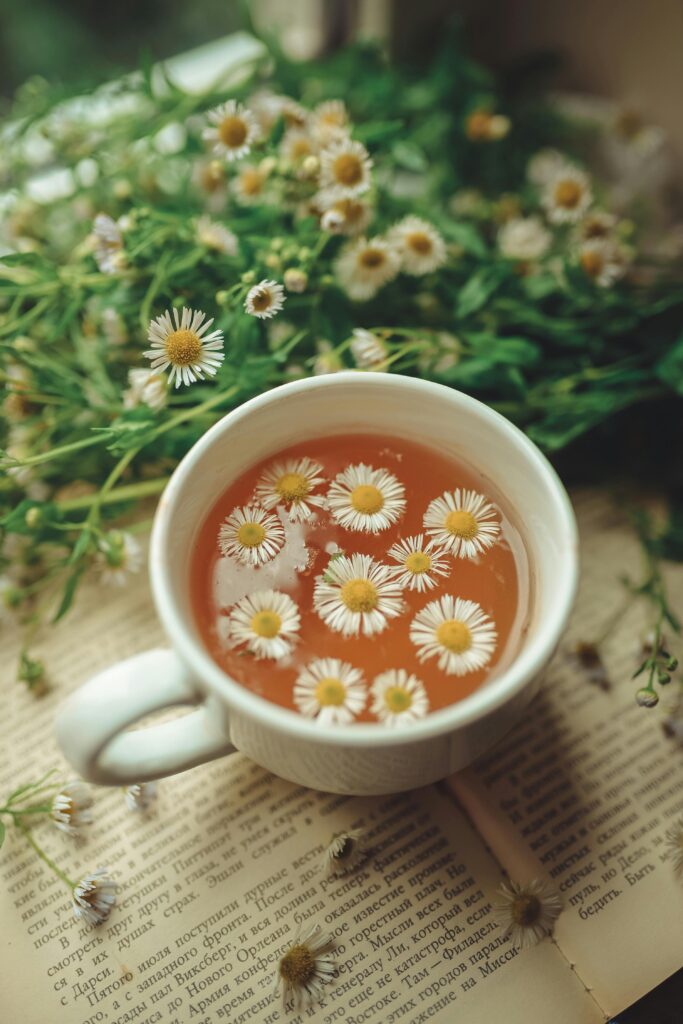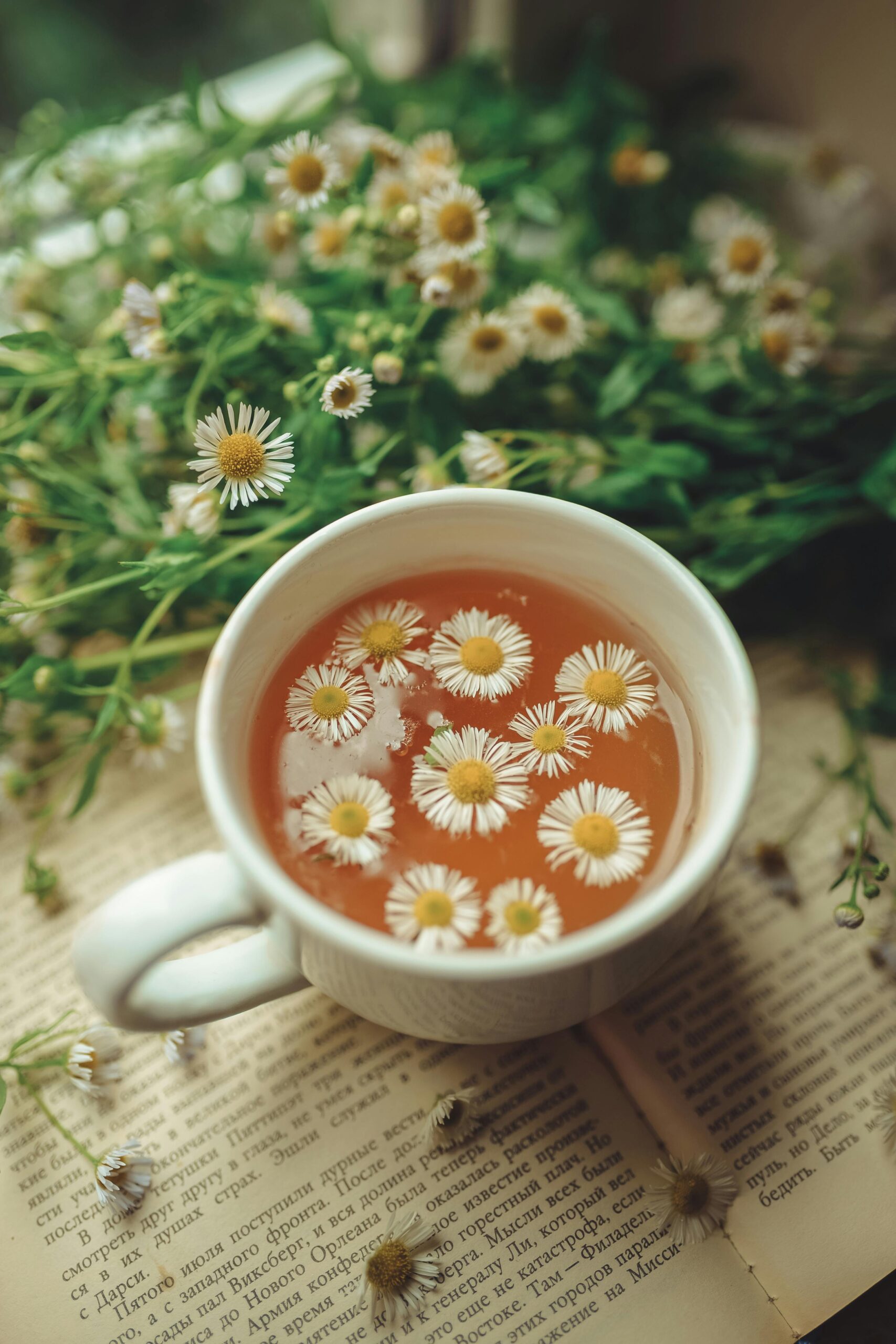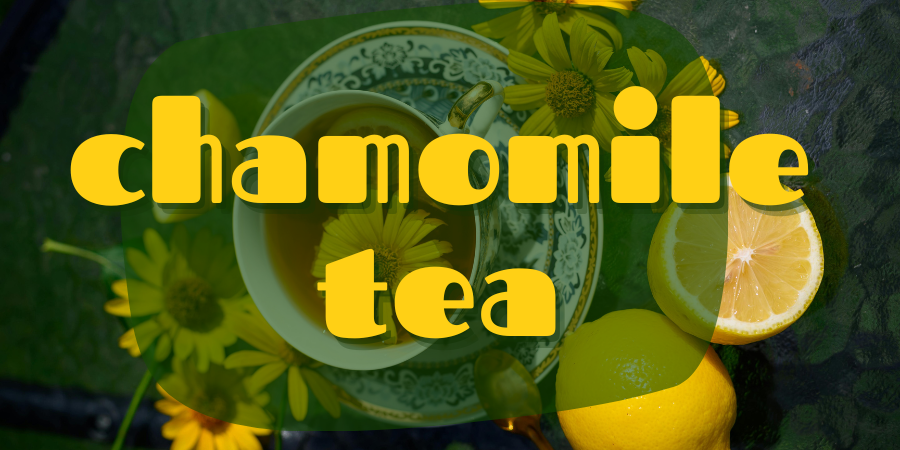Chamomile tea is a gentle, caffeine-free herbal infusion made from the dried flowers of the Matricaria chamomilla plant. Loved for its soothing aroma and subtle, apple-like taste, chamomile has long been regarded as a natural remedy for a wide array of ailments.
What is Chamomile?
Chamomile belongs to the daisy family (Asteraceae) and is commonly found in Europe, North Africa, and parts of Asia. The dried blossoms are used to make teas, tinctures, oils, and skin treatments.
Historical Use of Chamomile in Herbal Medicine
Ancient Egyptians dedicated chamomile to the sun, associating it with healing. Greek physicians like Hippocrates prescribed it for fevers and inflammations. Over time, it became a staple in traditional medicine across Europe and Asia for calming the mind and aiding digestion.
Nutritional Profile of Chamomile Tea
Chamomile tea is not rich in macronutrients, but it’s packed with powerful plant compounds.
Key Compounds and Antioxidants
Chamomile contains apigenin, luteolin, and quercetin, all of which are potent antioxidants that help fight oxidative stress. It also contains terpenoids, known for their anti-inflammatory properties.
Calories and Macronutrients
A cup of unsweetened chamomile tea contains:
- Calories: 0–2
- Protein: 0g
- Carbs: 0g
- Fat: 0g
This makes it a guilt-free beverage perfect for any time of day.
Health Benefits of Chamomile Tea
Promotes Sleep and Relaxation
Chamomile tea is perhaps best known for its calming effects. Apigenin binds to receptors in the brain that induce sleepiness, making it a popular nighttime beverage for those suffering from insomnia or restlessness.
Aids in Digestion
Chamomile tea helps relax the muscles of the gastrointestinal tract, easing bloating, indigestion, and gas. It’s also known to be helpful in managing symptoms of IBS (Irritable Bowel Syndrome).
Supports Immune Function
Its antibacterial and antiviral properties boost the immune system, potentially helping to fend off common colds and infections.
Helps Manage Blood Sugar Levels
Some studies suggest chamomile tea may improve glycemic control in people with type 2 diabetes by lowering blood sugar and insulin levels.
Anti-inflammatory Properties
Chamomile reduces inflammation throughout the body, aiding in the treatment of arthritis, sore throat, and inflammatory skin conditions.
Soothes Menstrual Cramps
Chamomile’s muscle-relaxing and anti-spasmodic properties help reduce menstrual pain and promote mood stability during PMS.
Chamomile Tea and Mental Wellness
Reduces Anxiety and Stress
Drinking chamomile tea activates the brain’s calming neurotransmitters. Several studies have shown significant reductions in Generalized Anxiety Disorder (GAD) symptoms with chamomile extract.
Enhances Mood Naturally
It boosts serotonin and dopamine levels, creating a gentle uplift in mood without any side effects.
Chamomile Tea for Skin Health
Fights Acne and Skin Irritations
Topical chamomile or drinking the tea regularly can help reduce acne, eczema, and dermatitis thanks to its anti-bacterial properties.
Promotes Healthy Glow
Its antioxidants help the skin combat free radicals, improving complexion and reducing signs of aging.
Steeping Time and Temperature
Brewing chamomile tea is simple but requires some attention to detail for maximum benefit:
- Water Temperature: 200°F (just below boiling)
- Steeping Time: 5–7 minutes for full flavor and effect
Avoid over-steeping, as it can result in bitterness.
Fresh Flowers vs. Tea Bags
- Fresh or Dried Flowers: Offer a more potent aroma and therapeutic effect.
- Tea Bags: Convenient but may lack some of the full-spectrum benefits.
Opt for organic, whole-flower chamomile for the best experience.
Best Time to Drink Chamomile Tea
Daytime vs. Nighttime Benefits
- Nighttime: Ideal for sleep support, stress relief, and unwinding after a long day.
- Daytime: Helps with digestion post-meal and reduces anxiety during stressful hours.
Drinking it 30–45 minutes before bedtime provides optimal sleep benefits.
Chamomile Tea vs. Other Herbal Teas
Chamomile vs. Peppermint
- Chamomile is better for sleep and relaxation.
- Peppermint offers more digestive and respiratory benefits.
Chamomile vs. Green Tea
- Green tea contains caffeine and is high in antioxidants like EGCG.
- Chamomile is caffeine-free and soothing, better suited for nighttime use. it can be the modern equivalent of elaichi chai or doodh patti without the caffeine content.
Potential Side Effects and Precautions
Allergies and Interactions
Chamomile belongs to the same family as ragweed, daisies, and marigolds. People allergic to these may experience:
- Skin irritation
- Breathing difficulties
- Eye inflammation
It may also interact with blood thinners, sedatives, and anti-coagulants.
Who Should Avoid Chamomile Tea
- People with plant allergies
- Individuals on blood-thinning medications
- Those scheduled for surgery (due to mild anticoagulant effect)
Chamomile Tea for Children and Pregnant Women
Safe Usage Guidelines
Chamomile is generally considered safe in moderation for children and pregnant women. However:
- Use only food-grade chamomile
- Start with weak infusions for toddlers
Pediatric and Prenatal Recommendations
- Children: Helps with colic, teething discomfort, and sleep
- Pregnancy: May ease nausea and anxiety, but consult a doctor before use
How to Grow Chamomile at Home
Planting and Harvesting Tips
- Sunlight: Needs full sun
- Soil: Well-draining, light soil
- Watering: Light and frequent
Harvest flowers when they are fully open and dry them in a cool, dark place.
Drying and Storing for Tea
- Spread flowers on a tray
- Keep them away from moisture
- Store in an airtight glass jar for up to 6 months
Buying Guide: Choosing the Best Chamomile Tea
Loose Leaf vs. Pre-Packaged
- Loose Leaf: Fresher and more aromatic
- Tea Bags: Convenient but may contain dust-grade tea
Organic vs. Conventional Options
Opt for USDA-certified organic brands to avoid pesticide contamination. chamomile tea recipe is available here

Storing Chamomile Tea Properly
Shelf Life and Storage Tips
- Store in airtight, dark glass containers
- Keep away from sunlight and heat
- Use within 6 months for best flavor and potency
Expert Opinions and Research Studies
Clinical Trials and Scientific Reviews
- A 2016 study in Phytomedicine showed significant reduction in GAD symptoms
- A 2005 study from Journal of Agricultural and Food Chemistry confirmed high antioxidant content
Herbalists’ Insights
Many herbalists recommend chamomile as a first-line herbal remedy for stress, colic, and skin issues due to its broad benefits and safety profile.
Frequently Asked Questions (FAQs)

Q1. Can I drink chamomile tea every day?
Yes, daily consumption is safe for most people and can promote consistent health benefits.
Q2. How long before bed should I drink chamomile tea?
About 30–45 minutes before bedtime is ideal.
Q3. Can chamomile tea help with weight loss?
While not a weight-loss tea directly, it supports digestion and stress control, which can aid weight management.
Q5. Can I apply chamomile tea topically?
Yes, cooled chamomile tea can be used to soothe skin irritations, sunburns, and rashes.
Chamomile tea is more than just a calming bedtime drink—it's a time-tested herbal remedy with profound effects on both body and mind. From promoting sleep and digestion to reducing inflammation and anxiety, it’s a must-have in every wellness routine. Whether enjoyed hot or cold, blended with lemon or milk, or used topically, chamomile tea proves that nature truly holds the key to gentle healing.
